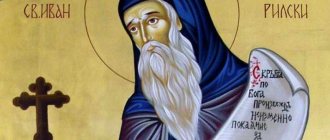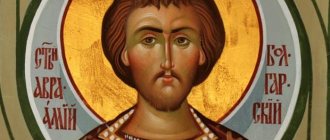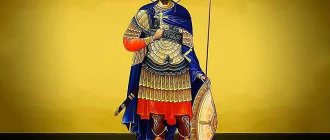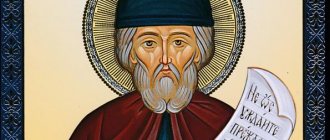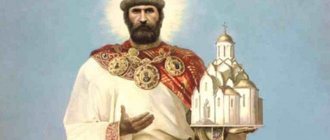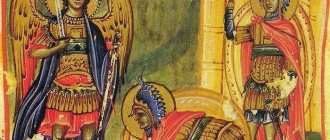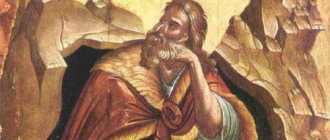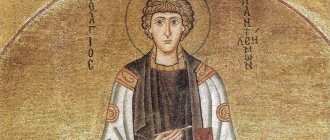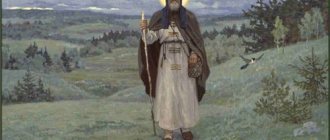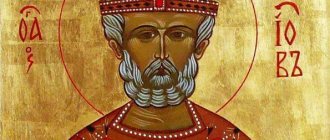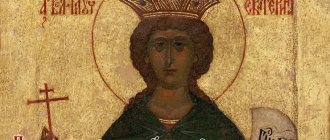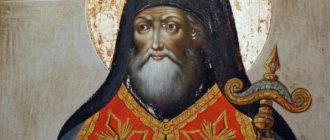short biography
Moses is the most famous of the Old Testament prophets, through whom God communicated with the Jews, as God's chosen people. The estimated period of life is 1500-1300 BC.
Origin
Moses was born in Egypt. His parents, Amram and Jochebed, were from the tribe of Levi. Like all Levites, the father was a priest and did not have land or livestock. The Jewish people, who had once voluntarily moved to Egypt and had significant benefits, by this time had been reduced to the status of slaves. Pharaoh, in order to limit the birth rate of the Jews, ordered the killing of newborn boys.
Moses' mother hid the child for 3 months, but was forced to put him in a basket and let him float down the Nile. A basket with a crying baby washed ashore in the place where the Pharaoh's daughter was bathing. She told the maids to get the baby. The name given to the child means “taken from water.”
Childhood and youth
Moses' older sister, Miriam, was nearby, watching to see who would see and take the basket containing the child. She invited the Pharaoh's daughter to find a nurse, to which she agreed. The child returned to his home, where no one could hurt him now.
When Moses was 2 years old, he was brought to the daughter of the ruler of Egypt, who made him her adopted son. Moses received a good education, having mastered the knowledge available to the Egyptians.
Life
Until the age of 40, he lived under the pharaoh, watching how his fellow tribesmen were oppressed. An incident of mistreatment of a Jewish overseer caused him to intervene and kill the Egyptian. Fleeing from punishment, Moses fled to the land of Midian, where he was sheltered by the local priest Raguel. Soon Moses married his daughter Zipporah.
thorn bush
40 years passed in the land of the Midianites. One day, Moses was tending sheep in the desert and saw fire on the sacred Mount Horeb. An irresistible force forced him to rise up. The sight of a thorn bush burning without heat, but not burning, horrified him. Moses heard a voice commanding him to take off his shoes and not approach the fire. Frightened Moses took off his shoes and covered his face with his hands. A voice from the thorn bush told him that he was the God of the descendants of Adam from his son Jacob and his name was Jehovah (Jehovah).
The Burning Bush became a symbol of the Holy Church: fire meant the suffering of the Jews, in the crucible of which it was purified, and a prototype of the Incarnation. God, who appeared to the shepherd, said that the groans of the Jews had reached him, and Moses’ duty was to save the people of Israel. The timid Moses humbly said that he was weak and tongue-tied, but he heard in response that God would always be with him and would put convincing speeches in his mouth.
As proof, God showed two miracles: he turned the staff into a snake, and leprosy appeared and disappeared on his hand. Thus, he gave Moses power over the Jewish people and endowed him with the ability to perform miracles. Jehovah assigned his elder brother Aaron to help Moses.
10 plagues
To fulfill the Lord's order, Aaron and Moses came to Pharaoh and, in the name of God, demanded that the Jews be released into the desert to perform holiday rituals. But Pharaoh did not recognize the faith of the Israelites and refused. To prove the power of the Lord, Aaron threw his rod on the ground, and it turned into a snake. The Egyptian priests did the same, and their rods were transformed into reptiles. But Aaron's rod swallowed up the rods of the Gentiles. Pharaoh did not heed the Lord's warning, and the Egyptians experienced the power of God's wrath.
Ten plagues were brought down by Jehovah on the people of Egypt before Pharaoh made concessions. First execution. Aaron struck the water of the Nile with his staff in front of the ruler and turned all the water in Egypt into blood. Only the Jews could take water from the river, and the Egyptians were forced to buy it from them. But Pharaoh was angry because he considered it witchcraft.
After 7 days, Aaron stretched out his hand and the earth was covered with frogs. Pharaoh began to ask Moses to beg God for deliverance from the frogs. Moses fulfilled his request, and the Lord cleansed the land. Pharaoh did not let the Jews go. Third execution. Aaron struck with his staff, and the Egyptians and their cattle were attacked by mosquitoes. Pharaoh did not take this as God's punishment, despite the beliefs of the priests.
The Lord told Moses to tell Pharaoh that if he did not fulfill his command, then the Egyptians would be attacked by dog flies. And so it happened. The entire land of Egypt suffered from the invasion of fierce insects, except for the area where the Jews lived. The frightened ruler agreed to release the Jews and promised to make a sacrifice to God, but after getting rid of the flies he again did not fulfill his promise.
God carried out the fifth plague without the mediation of Moses and Aaron, unleashing a pestilence on the Egyptian livestock. Moses threw a handful of ashes over himself. The wind blew away the dust particles, and all the Egyptians and cattle were covered with boils. But the Lord hardened the ruler’s heart so that he would feel the heavenly punishment even more strongly. God told Pharaoh that tomorrow he would send hail and lightning such as the land of Egypt had never seen. Moses was the doer of punishment. All the fields and gardens of the Egyptians were destroyed by hail, the terrible peals of thunder resembled the voice of God. The lands where Jews lived were not affected. Pharaoh repented and prayed to the Lord. But God did not want him to let the Jews go out of fear and hardened him.
The eighth plague was an invasion of locusts, which was brought by the east wind after the direction of Moses' rod. Pharaoh was ready to repent again, but God sent hatred into his heart so that the Egyptians would remember the disasters that befell them until the end of time. Moses raised his hands, and a night fell on Egypt, lasting 3 days. In vain the priests appealed to the god Ra, darkness swallowed up the country of the pagans. Pharaoh agreed to release the Jews if they did not take their flocks, but Moses disagreed, declaring that the next punishment would be even worse.
The month of Abib has arrived (from mid-March to mid-April). The Jews were preparing for the exodus. God commanded them to slaughter a lamb on the 14th day of Abib and anoint the doors of their houses with its blood. On the night of the 15th, God sent the Angel of Death to the land of Egypt. He killed all the firstborn of people and livestock, passing by Jewish dwellings marked with the blood of the lamb.
Establishment of Easter holiday
From that time on, the Jews began to celebrate the day of the slaughter of the lamb as a holiday, calling it Pesach (Easter), which means “to avoid something.” On this day they do not eat yeast bread, but prepare unleavened bread (unleavened bread).
The Old Testament tradition has a symbolic meaning.
The blood of the lamb anticipates the blood shed by Christ on the Cross for the sins of people. The Lamb of God (Jesus Christ) with his death atoned for the original sin of Adam, protecting the human race from the wrath of the Lord.
Refusal to eat traditional yeast dough means that the people of Israel did not accept pagan traditions. A simple and quick recipe for preparing unleavened dough testifies to the power of God, with what speed he freed the people from oppression. Easter tradition also requires that the lamb be served whole, without the head removed.
Exodus
Frightened by God's Providence, Pharaoh called Moses and Aaron and ordered them to lead the Jews out of Egypt. Before the start of the journey, the Lord commanded to baptize all the saved firstborns, from people to livestock. He decreed that the firstborn should be sanctified and given over to the service of God.
On the last night, the Jews celebrated Passover, took all their property, livestock, bones of the patriarchs, and more than two million people left Egypt. God determined the path to the promised land for the Jews. Day and night he moved in front of the column in the form of a pillar of fire. Pharaoh saw that his country was impoverished without the hardworking Hebrew slaves, and, forgetting about the punishments of the Lord, he gathered an army and set off after them.
Crossing the sea
Imminent death or return to Egypt threatened the Israelites: ahead was the sea, behind were the warriors of Pharaoh. The Lord commanded Moses to strike the water with his rod. A strong east wind blew, the sea parted, revealing the bottom. The Jews walked along the ground, between blocks of water frozen on both sides. When they had crossed half the sea, Pharaoh's army appeared on the shore. The ruler, without hesitation, gave the order to follow the Israeli column. Chariots with soldiers raced along the bottom of the Red Sea, but did not have time to catch up with the Jews. Finding himself on the shore, Moses struck the water with his rod again. The sea waves closed, leaving their pursuers in the abyss.
Education in the Pharaoh's Palace
By the will of God, the child ended up in the palace with Pharaoh’s wife Asiya, who took him into her care. The maids of the pharaoh's wife, seeing that a chest with a child was floating along the river, picked him up and took him to the palace, bringing the child to Asiya, who, seeing his face illuminated by the prophecy, begged her husband to leave the boy alive in the hope that the boy might be useful to them family. Pharaoh's entourage told him that this child could become a source of problems for him, so he should be thrown into the sea, but his wife did everything to save this child. Moses remained to live in the palace, but none of the nurses who were at the palace could feed this baby, since their breasts began to burn with fire, and then a Jewish nurse was found for the boy, who, at the behest of God, became Moses’ mother. The separation from his mother was short-lived: Allah Almighty fulfilled his promise and returned the child to his mother.
The pharaoh treated the child with distrust, and when one day the child grabbed him by the beard, almost tearing out a clump of hair, the pharaoh got angry and called the executioners to execute the baby. The wife begged for mercy on Moses and said that the baby did not yet understand what he was doing.
When Moses grew up and became an adult, the Lord sent him insight: Musa saw how much the ruler was oppressing his people, and then Moses began to denounce Pharaoh for being unfair to the Jewish people.
Miracles
The road through the desert was difficult. The people of Israel often grumbled against Moses, remembering their life in Egypt. The prophet, with the power given to him by the Lord, performed miracles to save people. In the Arabian desert, people suffered from thirst, the water was bitter from salt. At the command of Moses, a tree was thrown into the water, and it became sweet. The livestock died in the desert, and there was nothing left to eat. The cowardly people began to demand meat. God, through the prayer of Moses, sent manna from heaven for food throughout the entire exodus.
After several years, the manna became boring, and the Jews began to demand meat. An angry God sent a flock of quails, which they began to greedily eat and then die from gluttony. When the Amalekites attacked the Jewish camp, the prophet prayed throughout the battle, sitting on the mountain with his hands raised, because when he lowered his hands from fatigue, the enemy began to win.
The path to the promised land could have ended much faster if the spies sent by Moses had not reported that the lands to which Moses led them at the direction of the Lord were inhabited by giants. Angry Jews wanted to kill the prophet and return to Egypt. After this, Jehovah condemned them and appointed them to wander in the desert for 40 years, until those who came out of Egypt died.
With the onset of the fortieth year, the Jews reached the border of the country of Judea, in the desert of Sin. Because they were so thirsty, they began to murmur against Moses again. According to the decree of the Lord, he had to hit the rock once with his rod from which the spring would gush out. But Moses doubted God's words and struck twice. For his lack of faith in the power of God, Jehovah predicted to him that he and Aaron would die outside the promised land.
10 commandments
On Mount Sinai the prophet saw God and received instructions from him. In the third month of the exodus, the Jews approached the foot of Mount Sinai. At the command of Jehovah, Moses ascended the mountain alone, forbidding others to approach it.
For three days lightning flashed and thunder roared. The King of Heaven proclaimed the Ten Commandments for his chosen people. After which Moses went down and wrote them down in the Book. At the command of God, he again climbed to Sinai, where he did not eat or drink for 40 days and nights, and prayed to the Lord. The Lord gave him instructions about the construction of the tabernacle and inscribed the commandments for him on two stone slabs (tablets). The first 4 commandments reveal the relationship between man and God, the remaining 6 - between people.
Golden Taurus
In the absence of Moses, the people decided to create an Egyptian idol for themselves, casting the Golden Calf. The making of Taurus was a violation of the first Commandment, an apostasy. The prophet who descended from the mountain in anger broke the tablets, burned the Golden Calf and scattered its ashes. At his order, 3,000 instigators were killed.
After this, Moses returned to the top of Sinai and for 40 days prayed to Jehovah to forgive his people. The Lord heeded his request and ordered him to return to the mountain with new tablets. Moses fasted and prayed for another 40 days and nights. The Lord appeared to him, he fell on his face, but the divine glow remained on his face.
Construction of the Tabernacle
After 6 months, a camp temple (tabernacle) was built, as God commanded. Aaron and his sons were appointed priest. Moses placed the tablets with the Testament of the Lord there and covered them with a curtain. A divine cloud descended on the temple to consecrate the tabernacle. No one could enter the meeting. When the cloud left the temple, the Israelites continued their exodus.
Death
The fortieth year of wandering was coming to an end. Moses asked God who would give the reins of government to the people of Israel, blessed him and climbed to the top of Mount Nebo. The Lord showed him the promised land, promised to Abraham, Isaac and Jacob. After this, Moses died and was buried near the Jordan, near Jericho. His people mourned the prophet for thirty days.
Every year the Orthodox Church honors the memory of Moses on September 17.
Exodus of the Jews from Egypt, sending down the Torah (Tawra) on Mount Sinai
Moses had to lead his fellow Jews out under the cover of night, and when the Red Sea rose in front of them, the Prophet Moses, at the command of Allah Almighty, pushed the sea waves apart with a blow of his staff and crossed along the seabed with his people to the other shore. Pharaoh, having learned about the madness of the Israelites, gathered an army and gave chase, when Pharaoh's troops, led by the ruler, rushed after the Jewish people across the sea, the sea waters closed over them, and they died in its waves. Thanks to the help of the Lord, the exodus of the Jews from Egypt was successful and they were saved from torment and death from the Egyptians.
Pharaoh himself, seeing how the sea waves began to close over him and realizing his death, believed in the Lord, realizing His Power and his inevitable punishment, but his repentance was too late, the Lord preserved the body of Pharaoh as a sign for subsequent generations and this also became one from the great miracles: “ We carried the children of Israel (Israel) across the sea, and Pharaoh and his army followed them, rioting and acting hostile. When Pharaoh began to drown, he said: “I have believed that there is no God except Him in whom the children of Israel (Israel) have believed. I became one of the Muslims." Allah said: “Only now! But before, you disobeyed and were one of the spreaders of wickedness. Today We will save your body so that you may become a sign for those who will come after you.” Indeed, many people neglect Our signs ” (Surah Yunus, verses 90-92).
Lyrics
A prayer and a canon are dedicated to the Prophet Moses.
Prayer
“Oh, most holy Moses, prophet of God! Hear our prayers and come to our aid, protect us from our enemies, from troubles and grief, from evil and dishonor. Don't leave us unattended. Pray to the Lord in Heaven for us and ask for protection for us and the souls of our sinners. May your name be glorified, may Orthodox people praise you and bow before you! Protect our souls and do not let us go astray. From now on and forever and ever. Amen".
Canon
Death of a Kebitite at the hands of Moses
A case is described of how Moses was walking through the city and saw one of the Kebitites fighting with an Israeli who turned to the passing Musa for help. Moses hastened to help in order to prevent injustice and cruelty, because he knew that the Cebites, who at that time were considered an aristocratic category of the population, treated the Israelites cruelly. There is also a version according to which Musa confronted the Kebitite because he refused to pay the Israeli for his work. During the fight, Musa hit his opponent hard in the chest, and he fell dead. Musa had no intention of killing him, since this would cause problems not only for him, but also for the Israeli. Moses immediately repented of the unintentional murder and began to ask for forgiveness from the Almighty. This incident marked the beginning of the Sebitan uprising, which made Musa very nervous: he expected trouble every minute, because his fight became public knowledge.
People from Pharaoh's entourage and the priests expressed dissatisfaction with what Musa said and began to weave intrigues against him. And this event was told to Pharaoh, who gave the order to execute Moses. Pharaoh had a relative named Hezicles, who warned Moses about the danger threatening him. Musa hastily left the city and fled to the south of Sham to the city of Midian, since the power of the pharaoh did not extend to this city.
The Israelite People's Forty-Year Desert Journey
The Jewish people stood near Mount Sinai for about a year. Then the Lord gave a sign that we needed to move on. The story of Moses as a prophet continued. He continued to bear the burden of mediating between his people and the Lord. For forty years they wandered through the desert, sometimes living for a long time in places where conditions were more favorable. The Israelites gradually became zealous fulfillers of the covenants that the Lord gave them.
Of course, there were outrages. Not everyone was comfortable with such long journeys. However, as the story of Moses from the Bible testifies, the people of Israel still reached the Promised Land. However, the prophet himself never reached it. Moses had a revelation that another leader would lead them further. He died at the age of 120, but no one ever found out where it happened, since his death was a secret.
Historical facts confirming biblical events
Moses, whose life story we know only from biblical accounts, is a significant figure. However, is there official data that confirms his existence as a historical figure? Some consider all this just a beautiful legend that was invented.
However, some historians are still inclined to believe that Moses is a historical figure. This is evidenced by some information contained in the biblical story (slaves in Egypt, the birth of Moses). Thus, we can say that this is far from a fictional story, and all these miracles actually happened in those distant times.
It should be noted that today this event has been depicted more than once in cinema, and cartoons have also been created. They tell about heroes such as Moses and Ramses, whose history is little described in the Bible. Particular attention in the cinema is paid to the miracles that happened during their journey. Be that as it may, all these films and cartoons educate and instill morality in the younger generation. They are also useful for adults, especially those who have lost faith in miracles.
Batya's further fate[↑]
Batya left Egypt with the Jews. In Divrei Ha-Yamim it is reported that she became the wife of Caleb ben Yefuneh (it is known that he was the husband of Miriam - it is not clear whether during Miriam’s life or after her death he took Batya as his wife).
It is interesting that Kalev and Batya had a similar quality - both fearlessly opposed the opinion of the majority: Kalev - in the story of the meraglim
(scouts) who defamed the Land of Israel, and Batya managed to resist the influence of the environment in which she grew up. She renounced idolatry and violated Pharaoh's orders at the risk of her life.
Prophet Musa and Prophet Muhammad ﷺ
The life story of the Prophet Musa most closely resembles the life of the Prophet Muhammad ﷺ, who was also the leader of his community and made all his efforts to convert the Arab pagans in Mecca to monotheism.
The Holy Book of the Koran, telling the story of the life of Musa, draws parallels with the history of the prophetic mission of Muhammad ﷺ: Pharaoh did not want to listen to Musa, and the Meccans did not want to listen to Muhammad ﷺ. Like Prophet Muhammad ﷺ, Prophet Musa brought into the world the great law of God, which was revealed to him on Mount Sinai.
For Muslims, Musa is a revered and great Prophet, the true bearer of the prophetic mission. From the history of Prophet Musa and his people, Muslims take many useful examples and instructions, which are given both in the Holy Quran and in the hadiths of the Prophet Muhammad ﷺ.
